-
 Bitcoin
Bitcoin $81,973.5211
-3.14% -
 Ethereum
Ethereum $1,771.8221
-4.70% -
 Tether USDt
Tether USDt $0.9996
-0.04% -
 XRP
XRP $2.0020
-4.93% -
 BNB
BNB $586.3762
-2.30% -
 USDC
USDC $0.9997
-0.03% -
 Solana
Solana $113.7739
-9.53% -
 Dogecoin
Dogecoin $0.1574
-7.43% -
 Cardano
Cardano $0.6244
-7.96% -
 TRON
TRON $0.2315
-2.36% -
 Toncoin
Toncoin $3.6020
-10.34% -
 UNUS SED LEO
UNUS SED LEO $9.3401
-1.03% -
 Chainlink
Chainlink $12.4356
-7.28% -
 Stellar
Stellar $0.2536
-4.73% -
 Avalanche
Avalanche $17.8372
-6.13% -
 Sui
Sui $2.2393
-7.83% -
 Shiba Inu
Shiba Inu $0.0...01195
-3.16% -
 Hedera
Hedera $0.1559
-5.48% -
 Litecoin
Litecoin $80.9170
-1.94% -
 Polkadot
Polkadot $3.8852
-4.23% -
 MANTRA
MANTRA $6.2821
-0.06% -
 Bitcoin Cash
Bitcoin Cash $298.6048
-1.78% -
 Bitget Token
Bitget Token $4.4929
-1.56% -
 Dai
Dai $0.9999
0.01% -
 Ethena USDe
Ethena USDe $0.9995
-0.03% -
 Monero
Monero $211.5827
-1.86% -
 Pi
Pi $0.5588
-16.11% -
 Hyperliquid
Hyperliquid $11.3193
-14.69% -
 Uniswap
Uniswap $5.7424
-4.67% -
 Aptos
Aptos $5.0458
-3.81%
What factors affect the price of blockchain system development?
The cost of blockchain development varies with project complexity, platform choice, team expertise, and integration needs, among other factors.
Apr 01, 2025 at 01:07 pm
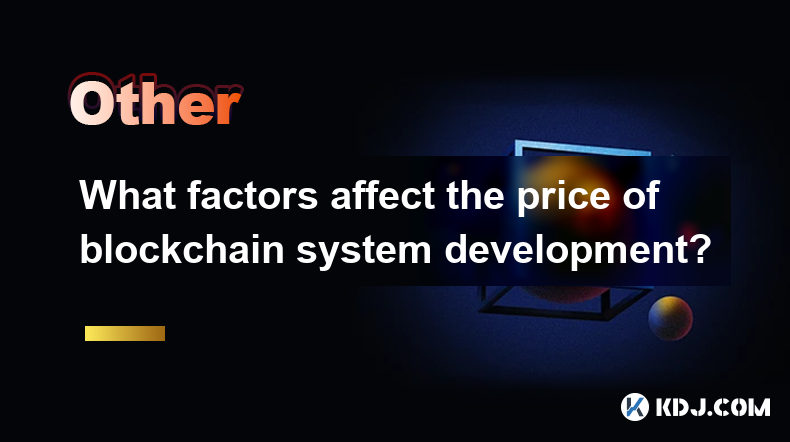
The price of blockchain system development can be influenced by a variety of factors. Understanding these elements is crucial for businesses and developers looking to invest in blockchain technology. From the complexity of the project to the expertise of the development team, each aspect plays a significant role in determining the overall cost. In this article, we will delve into the key factors that affect the price of blockchain system development, providing a comprehensive overview to help you make informed decisions.
Complexity of the Blockchain Project
The complexity of a blockchain project is one of the primary factors that influence its development cost. A simple blockchain application, such as a basic token or a straightforward smart contract, will generally be less expensive to develop than a more complex system. Complex projects might include features like decentralized finance (DeFi) platforms, supply chain management systems, or multi-layered security protocols. Each additional feature or layer of complexity requires more time and resources, thus increasing the overall cost.
Type of Blockchain Platform
The choice of blockchain platform can significantly impact the development cost. Public blockchains like Ethereum or Bitcoin are often more cost-effective due to their open-source nature and large developer communities. However, they may come with limitations such as slower transaction speeds or higher fees. On the other hand, private or consortium blockchains, like Hyperledger Fabric or Corda, offer more customization and control but can be more expensive to develop and maintain. The decision between these platforms depends on the specific needs of the project and can greatly influence the budget.
Development Team Expertise and Location
The expertise and location of the development team are crucial factors in determining the cost of blockchain system development. Highly experienced developers with a strong track record in blockchain technology will command higher salaries than those with less experience. Additionally, the geographical location of the team can affect costs due to differences in living expenses and market rates for tech talent. For instance, hiring developers from regions with lower costs of living, such as Eastern Europe or Asia, can be more budget-friendly than hiring from North America or Western Europe.
Project Timeline and Urgency
The timeline and urgency of a blockchain project can also impact its development cost. Projects with tight deadlines often require more resources, such as additional developers or overtime work, which can increase expenses. Conversely, projects with more flexible timelines may allow for a more cost-effective approach, as developers can work at a steady pace without the need for rush fees. It's important to balance the urgency of the project with the available budget to ensure the best possible outcome.
Integration with Existing Systems
Integrating a new blockchain system with existing infrastructure can add to the development cost. This integration might involve connecting the blockchain to databases, ERP systems, or other legacy systems. The complexity of these integrations can vary widely, depending on the age and compatibility of the existing systems. More complex integrations require more time and expertise, thus increasing the overall cost. It's essential to assess the integration needs early in the planning process to accurately estimate the budget.
Security and Compliance Requirements
Security and compliance are critical aspects of blockchain development that can significantly affect costs. Blockchain systems often handle sensitive data and financial transactions, making robust security measures essential. Implementing advanced security protocols, such as multi-signature wallets, encryption, and regular security audits, can increase development costs. Additionally, compliance with regulations like GDPR, KYC, and AML can add complexity and cost to the project. Ensuring that the blockchain system meets all necessary security and compliance standards is crucial but can be a significant expense.
Scalability and Performance Needs
The scalability and performance requirements of a blockchain system can also impact its development cost. Systems designed to handle high transaction volumes or to scale rapidly will require more sophisticated architecture and possibly more resources. For instance, implementing sharding, layer-2 solutions, or other scalability techniques can increase the complexity and cost of development. It's important to clearly define the scalability and performance needs of the project to ensure that the blockchain system can meet future demands without incurring unnecessary expenses.
Customization and Unique Features
Customization and the inclusion of unique features can significantly affect the cost of blockchain system development. While off-the-shelf solutions may be more cost-effective, they often lack the flexibility to meet specific business needs. Customizing a blockchain system to include unique features, such as proprietary algorithms or specialized smart contracts, requires more time and expertise, thus increasing the cost. It's essential to weigh the benefits of customization against the additional expense to determine the best approach for your project.
Testing and Quality Assurance
Testing and quality assurance are vital components of blockchain system development that can impact the overall cost. Thorough testing is necessary to ensure that the system functions correctly and securely. This process can include unit testing, integration testing, and stress testing, among others. The more complex the system, the more extensive the testing required, which can increase costs. Additionally, hiring experienced testers or using specialized testing tools can add to the budget. Ensuring high-quality testing is essential for the success of the project but can be a significant expense.
Maintenance and Support
The cost of blockchain system development doesn't end with the initial build. Ongoing maintenance and support are crucial for ensuring the system's long-term success. This can include regular updates, bug fixes, and monitoring to ensure the system remains secure and efficient. The complexity of the system and the level of support required can significantly impact these ongoing costs. It's important to factor in these expenses when budgeting for a blockchain project to avoid unexpected costs down the line.
Market Conditions and Cryptocurrency Prices
Market conditions and the prices of cryptocurrencies can also influence the cost of blockchain system development. For instance, if the project involves developing a token or cryptocurrency, the cost of the underlying blockchain's native token (e.g., Ethereum's ETH) can affect the overall budget. Fluctuations in cryptocurrency prices can lead to higher or lower development costs, depending on the timing of transactions and the need for tokens. Keeping an eye on market trends and planning accordingly can help manage these costs more effectively.
Use of Third-Party Services and Tools
The use of third-party services and tools can also impact the cost of blockchain system development. These might include cloud services, APIs, or specialized blockchain development platforms. While these tools can streamline the development process and reduce the time required, they often come with additional costs. It's important to evaluate the benefits and costs of these services to determine whether they are worth the investment. Choosing the right tools can help manage the budget more effectively while still achieving the desired outcomes.
Project Scope and Requirements
The scope and requirements of the blockchain project are fundamental factors that affect its development cost. A well-defined project scope helps in accurately estimating the resources and time needed, thus providing a clearer picture of the budget. Changes in scope during the development process, often referred to as scope creep, can lead to increased costs and delays. It's crucial to have a detailed project plan and to manage scope changes carefully to keep the project within budget. Clear communication and regular updates with all stakeholders can help in maintaining the project's scope and controlling costs.
Regulatory Environment
The regulatory environment in which the blockchain system will operate can also impact its development cost. Different regions have varying regulations regarding blockchain and cryptocurrencies, which can affect the project's complexity and compliance requirements. For instance, developing a blockchain system for use in a highly regulated industry like finance or healthcare may require additional compliance measures, increasing the cost. Staying informed about the regulatory landscape and planning accordingly can help manage these costs more effectively.
User Experience and Interface Design
The user experience (UX) and interface design of a blockchain system can also influence its development cost. A well-designed user interface can enhance the system's usability and adoption, but it requires additional time and expertise to develop. This might involve hiring UX/UI designers or investing in user testing and feedback. The more complex the user interface, the higher the cost. Balancing the need for a user-friendly interface with the budget constraints is essential for the success of the project.
Tokenomics and Economic Model
If the blockchain project involves creating a token or cryptocurrency, the design of the tokenomics and economic model can impact the development cost. Developing a robust economic model requires careful planning and expertise to ensure the token's value and utility. This might involve creating mechanisms for token distribution, incentives, and governance. The complexity of the tokenomics can add to the overall cost of the project. It's important to consider these factors early in the planning process to accurately estimate the budget.
Community and Ecosystem Development
Building a community and ecosystem around a blockchain project can also affect its development cost. This might involve marketing efforts, community management, and partnerships with other projects or organizations. Developing a strong community can enhance the project's adoption and success but requires additional resources and investment. The cost of these efforts can vary widely depending on the scale and scope of the community-building activities. It's important to factor in these costs when planning the project's budget.
FAQs
Q: How does the complexity of a blockchain project affect its development cost?
A: The complexity of a blockchain project directly impacts its development cost. More complex projects, such as those involving DeFi platforms or multi-layered security protocols, require more time and resources, thus increasing the overall cost.
Q: What role does the choice of blockchain platform play in development costs?
A: The choice of blockchain platform can significantly affect development costs. Public blockchains like Ethereum are often more cost-effective but may have limitations, while private or consortium blockchains like Hyperledger Fabric offer more customization but can be more expensive.
Q: How does the expertise and location of the development team influence the cost of blockchain system development?
A: Highly experienced developers command higher salaries, and their geographical location can affect costs due to differences in living expenses. Hiring from regions with lower costs of living can be more budget-friendly.
Q: Can the project timeline and urgency impact the development cost of a blockchain system?
A: Yes, projects with tight deadlines often require more resources, such as additional developers or overtime work, which can increase expenses. More flexible timelines can allow for a more cost-effective approach.
Q: How does integrating a blockchain system with existing infrastructure affect its development cost?
A: Integration with existing systems can add to the development cost, as it might involve connecting the blockchain to databases or other legacy systems. The complexity of these integrations can vary widely, impacting the overall budget.
Q: What impact do security and compliance requirements have on the cost of blockchain system development?
A: Security and compliance are critical and can significantly increase costs. Implementing advanced security protocols and ensuring compliance with regulations like GDPR and AML add complexity and expense to the project.
Q: How do scalability and performance needs affect the cost of blockchain system development?
A: Systems designed to handle high transaction volumes or to scale rapidly require more sophisticated architecture, which can increase development costs. Implementing scalability techniques like sharding can add to the complexity and cost.
Q: What role does customization and the inclusion of unique features play in the cost of blockchain system development?
A: Customization and unique features can significantly increase costs. While off-the-shelf solutions may be more cost-effective, they often lack the flexibility to meet specific business needs, requiring more time and expertise for customization.
Q: How do testing and quality assurance impact the cost of blockchain system development?
A: Thorough testing is essential for ensuring the system's functionality and security, but it can increase costs. The more complex the system, the more extensive the testing required, which can add to the budget.
Q: What are the ongoing costs associated with blockchain system development?
A: Ongoing maintenance and support are crucial for the system's long-term success. These costs can include regular updates, bug fixes, and monitoring, and can vary based on the system's complexity and support needs.
Q: How do market conditions and cryptocurrency prices affect the cost of blockchain system development?
A: Market conditions and cryptocurrency prices can influence costs, especially if the project involves developing a token. Fluctuations in cryptocurrency prices can lead to higher or lower development costs depending on the timing of transactions.
Q: What impact does the use of third-party services and tools have on the cost of blockchain system development?
A: Third-party services and tools can streamline development but often come with additional costs. Evaluating the benefits and costs of these services is important for managing the budget effectively.
Q: How does the project scope and requirements affect the cost of blockchain system development?
A: A well-defined project scope helps in accurately estimating resources and time, thus providing a clearer budget picture. Changes in scope can lead to increased costs and delays, making scope management crucial.
Q: What role does the regulatory environment play in the cost of blockchain system development?
A: The regulatory environment can impact costs, especially in highly regulated industries. Compliance with regulations like GDPR and AML can add complexity and expense to the project.
Q: How does user experience and interface design affect the cost of blockchain system development?
A: A well-designed user interface enhances usability and adoption but requires additional time and expertise, increasing costs. Balancing the need for a user-friendly interface with budget constraints is essential.
Q: What impact does the design of tokenomics and the economic model have on the cost of blockchain system development?
A: Developing a robust economic model for a token or cryptocurrency requires careful planning and expertise, adding to the overall cost. The complexity of the tokenomics can significantly impact the project's budget.
Q: How does community and ecosystem development affect the cost of blockchain system development?
A: Building a community and ecosystem around a blockchain project requires additional resources and investment. The cost of these efforts can vary widely depending on the scale and scope of community-building activities.
Disclaimer:info@kdj.com
The information provided is not trading advice. kdj.com does not assume any responsibility for any investments made based on the information provided in this article. Cryptocurrencies are highly volatile and it is highly recommended that you invest with caution after thorough research!
If you believe that the content used on this website infringes your copyright, please contact us immediately (info@kdj.com) and we will delete it promptly.
- Why XRP Investors Are Rushing to ExoraPad Presale
- 2025-04-03 21:45:12
- Polkadot (CRYPTO: DOT) cryptocurrency isn't getting any market love these days
- 2025-04-03 21:45:12
- Despite Launching the RLUSD Stablecoin, XRP Price Dips as Trump's Tariffs Trigger Market Turmoil
- 2025-04-03 21:40:11
- Ripple Has Once Again Unlocked a Massive 1 Billion XRP
- 2025-04-03 21:40:11
- Bitcoin price crashes to $80k as Trump announces tariffs on 50+ countries
- 2025-04-03 21:35:12
- Prominent crypto analyst sparks excitement with bold forecasts for Ethereum and Ripple
- 2025-04-03 21:35:12
Related knowledge

What are the future development trends of blockchain game development?
Apr 03,2025 at 05:00am
Blockchain technology has revolutionized various industries, and gaming is no exception. As we look to the future, several trends are set to shape the development of blockchain games. These trends not only promise to enhance the gaming experience but also to integrate blockchain technology more seamlessly into the gaming ecosystem. Let's explore these t...

What are the maintenance costs of blockchain system development?
Apr 03,2025 at 06:07pm
The maintenance costs of blockchain system development are multifaceted and depend on various factors. These costs can include technical maintenance, security updates, infrastructure expenses, and personnel costs. Understanding these elements is crucial for anyone planning to develop or maintain a blockchain system. Technical MaintenanceTechnical mainte...
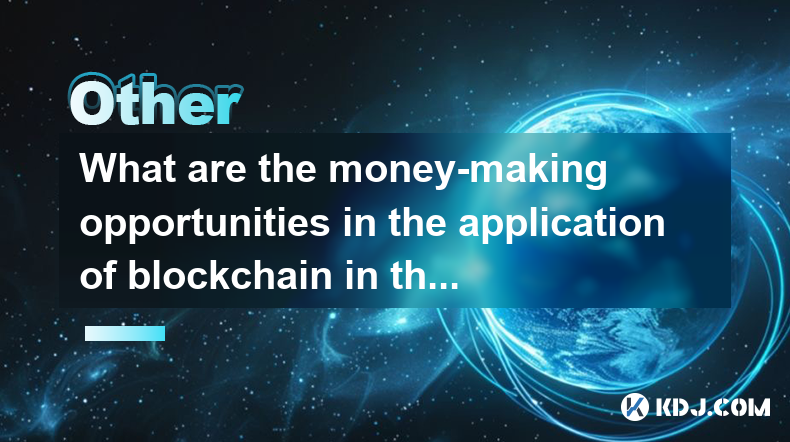
What are the money-making opportunities in the application of blockchain in the medical industry?
Apr 03,2025 at 03:35am
The integration of blockchain technology into the medical industry presents a myriad of money-making opportunities that can revolutionize healthcare systems. Blockchain's inherent characteristics, such as transparency, security, and immutability, make it an ideal solution for various medical applications. By leveraging blockchain, companies can develop ...
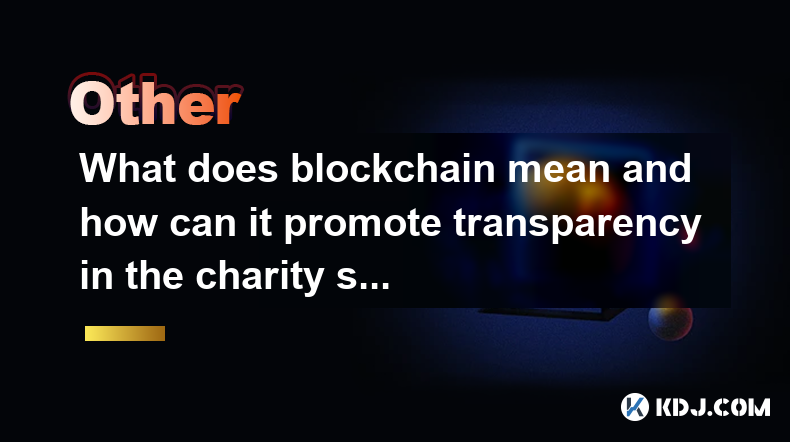
What does blockchain mean and how can it promote transparency in the charity sector?
Apr 03,2025 at 08:29pm
Blockchain technology is a decentralized, distributed ledger that records transactions across numerous computers. This ensures that the data is transparent and nearly impossible to alter retroactively. Essentially, blockchain serves as a digital ledger of all cryptocurrency transactions, enabling secure and direct exchanges without the need for intermed...
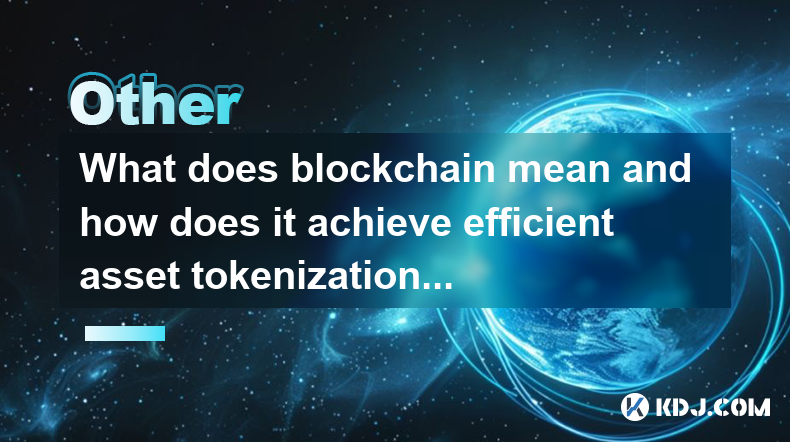
What does blockchain mean and how does it achieve efficient asset tokenization?
Apr 03,2025 at 07:57pm
Blockchain technology is a decentralized, distributed ledger that records transactions across numerous computers. It ensures that each transaction is secure, transparent, and immutable. The concept of blockchain was introduced with the launch of Bitcoin in 2009, but its applications have since expanded far beyond cryptocurrencies. At its core, blockchai...
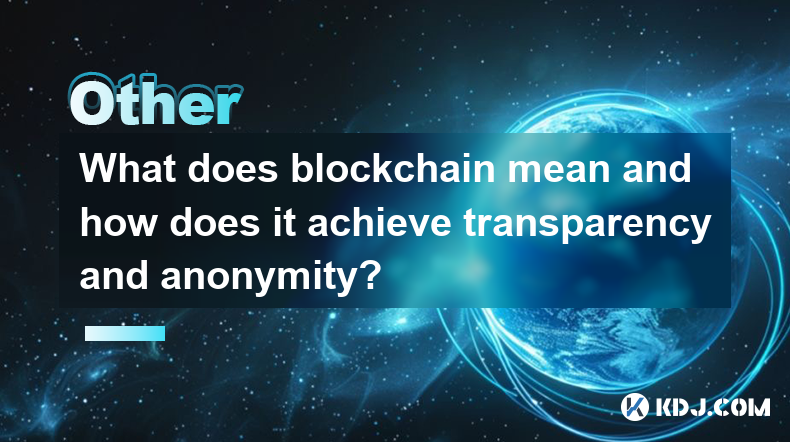
What does blockchain mean and how does it achieve transparency and anonymity?
Apr 03,2025 at 11:28am
Blockchain technology is a decentralized, distributed ledger that records transactions across numerous computers. It ensures that once data is recorded, it cannot be altered retroactively without the alteration of all subsequent blocks and the consensus of the network. This technology underpins cryptocurrencies like Bitcoin and Ethereum, providing a sec...

What are the future development trends of blockchain game development?
Apr 03,2025 at 05:00am
Blockchain technology has revolutionized various industries, and gaming is no exception. As we look to the future, several trends are set to shape the development of blockchain games. These trends not only promise to enhance the gaming experience but also to integrate blockchain technology more seamlessly into the gaming ecosystem. Let's explore these t...

What are the maintenance costs of blockchain system development?
Apr 03,2025 at 06:07pm
The maintenance costs of blockchain system development are multifaceted and depend on various factors. These costs can include technical maintenance, security updates, infrastructure expenses, and personnel costs. Understanding these elements is crucial for anyone planning to develop or maintain a blockchain system. Technical MaintenanceTechnical mainte...

What are the money-making opportunities in the application of blockchain in the medical industry?
Apr 03,2025 at 03:35am
The integration of blockchain technology into the medical industry presents a myriad of money-making opportunities that can revolutionize healthcare systems. Blockchain's inherent characteristics, such as transparency, security, and immutability, make it an ideal solution for various medical applications. By leveraging blockchain, companies can develop ...

What does blockchain mean and how can it promote transparency in the charity sector?
Apr 03,2025 at 08:29pm
Blockchain technology is a decentralized, distributed ledger that records transactions across numerous computers. This ensures that the data is transparent and nearly impossible to alter retroactively. Essentially, blockchain serves as a digital ledger of all cryptocurrency transactions, enabling secure and direct exchanges without the need for intermed...

What does blockchain mean and how does it achieve efficient asset tokenization?
Apr 03,2025 at 07:57pm
Blockchain technology is a decentralized, distributed ledger that records transactions across numerous computers. It ensures that each transaction is secure, transparent, and immutable. The concept of blockchain was introduced with the launch of Bitcoin in 2009, but its applications have since expanded far beyond cryptocurrencies. At its core, blockchai...

What does blockchain mean and how does it achieve transparency and anonymity?
Apr 03,2025 at 11:28am
Blockchain technology is a decentralized, distributed ledger that records transactions across numerous computers. It ensures that once data is recorded, it cannot be altered retroactively without the alteration of all subsequent blocks and the consensus of the network. This technology underpins cryptocurrencies like Bitcoin and Ethereum, providing a sec...
See all articles























































































